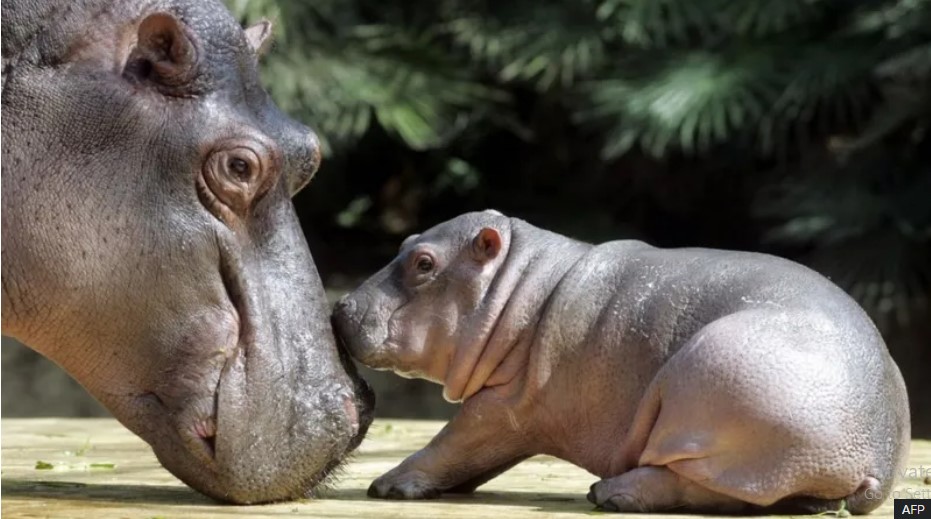Baby Hippo Love with Mother – A Bond of Nature’s Purest Form
In the wild, few relationships are as heartwarming and strong as the bond between a mother and her baby. Among the many animals that demonstrate this connection, the baby hippopotamus, or calf, shares a particularly touching and deep bond with its mother. These gentle giants, often misunderstood due to their size and strength, showcase an affectionate and protective nature when it comes to their young.
The Beginning of a Beautiful Bond
When a baby hippo 🦛 is born, it usually weighs between 25 to 50 kilograms. It may be born on land or underwater, depending on the mother’s choice. From the moment of birth, the mother becomes the baby’s entire world. She helps the newborn surface for air if it is born underwater and stays close by at all times to ensure its safety.
The first few weeks are crucial. The mother keeps the calf away from the rest of the pod to strengthen their bond and protect it from any accidental harm by other adult hippos. During this period, the calf is highly dependent on its mother for milk, warmth, and comfort.
Nurturing and Feeding
Baby hippos feed 🍼 on their mother’s milk for up to eight months, though they begin nibbling on grass as early as three weeks old. They nurse both on land and underwater, and it’s fascinating to see how they can close their ears and nostrils while suckling underwater.
The mother is incredibly patient and gentle during this phase. She allows the calf to feed frequently and ensures it is well-fed and comfortable. This nurturing behaviour builds a deep emotional connection between the two.
Swimming Side by Side
Hippos are semi-aquatic animals 🌊 and spend a large portion of their lives in water. The baby hippo, although not a strong swimmer at birth, learns quickly by observing and mimicking its mother. She stays by its side constantly, teaching it how to navigate water safely and communicate with other hippos through sounds and body language.
The water not only provides safety and coolness from the African heat, but also a playground where the baby and mother share joyful moments together—splashing, swimming, and bonding.
🛡️ Protection and Care
Despite their cute appearance, hippos are considered one of the most dangerous animals in Africa due to their territorial nature and immense strength. When it comes to their calves, mother hippos are fiercely protective.
They will charge at threats—including crocodiles, lions, or even humans—if they sense danger near their young. This protection ensures the baby can grow safely in its early stages of life, learning vital survival skills under the mother’s watchful eye.
Emotional Connection and Affection
Observers often note how baby hippos are always close to their mothers, often snuggling, nudging, or resting their heads against them. These tender gestures show a level of emotional attachment 💞 that goes beyond basic survival needs.
In many ways, the bond between a mother hippo and her calf mirrors the kind of love seen in many human and animal relationships—marked by care, protection, and affection.
The Journey to Independence
As the baby hippo grows 🐾 , it gradually starts spending more time exploring and interacting with other members of the pod. However, the mother still keeps a close eye on her young one, guiding and supporting it until it becomes strong and independent—usually around 18 months to 2 years.
This slow transition ensures that the calf learns all the necessary skills for adulthood, always backed by the silent strength of a mother’s love.
Conclusion
The love between a baby hippo and its mother 🌿 is one of the most beautiful sights in nature. It’s a reminder that even the largest, most powerful animals have a soft side full of affection and care. Their relationship is based on trust, warmth, and an unbreakable natural bond that shapes the calf’s future in the wild.
FAQs about Baby Hippo and Mother Bond
1. How long does a baby hippo stay with its mother?
A baby hippo stays with its mother for up to 2 years, gradually becoming more independent over time.
2. Can a baby hippo swim at birth?
While not strong swimmers at birth, baby hippos can float and are taught by their mothers how to move and breathe in water.
3. Do mother hippos protect their babies?
Yes, mother hippos are extremely protective and will attack any predator that comes too close to their calf.
4. What do baby hippos eat?
Baby hippos primarily drink their mother’s milk for the first 6–8 months and begin grazing on grass after 3 weeks.
5. Are baby hippos social with other animals?
Initially, baby hippos are mostly attached to their mothers but gradually begin interacting with other hippos in the pod as they grow.


Leave a Reply